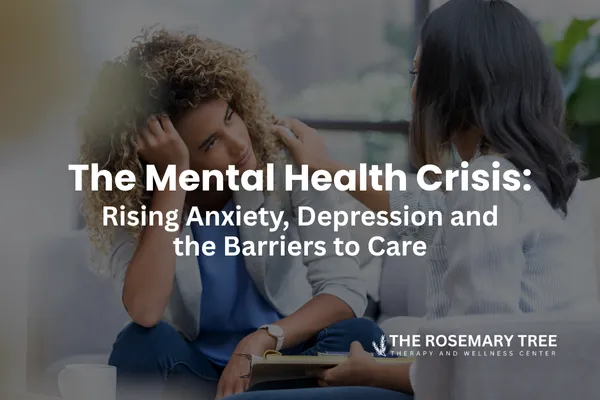
The Mental Health Crisis: Rising Anxiety, Depression and the Barriers to Care
Introduction: The Perfect Storm
If it feels like everyone around you is talking about anxiety, depression or burnout, it’s not just your imagination. In the past few years, rates of mental‑health concerns have climbed sharply, with many adults reporting that they feel more anxious than they did the year before. At the same time, headlines about insurers restricting benefits and cuts to behavioral‑health services paint a bleak picture of access to care. Add in skyrocketing living costs – rent, utilities, groceries and fuel – and families find themselves choosing between basic necessities and mental‑health support. It’s no wonder people feel confused, exhausted and disconnected.
The State of Mental Health Today
Multiple national polls and research studies show a clear trend: anxiety, depression and obsessive‑compulsive disorder are all on the rise. Nearly half of adults say they feel more anxious than the previous year, and younger adults are even more likely to report elevated stress levels. Factors driving this surge include global and local turmoil, relentless exposure to news, social media pressures, and economic uncertainty. Meanwhile, only about a quarter of adults have spoken with a mental‑health professional in the past year. Among those who have sought help, many worry about losing access to care and health‑insurance coverage as political and economic winds shift.
Behind the statistics are real people struggling with real pain. Anxiety can look like chronic worry, restlessness and a racing heart. Depression often brings persistent sadness, lack of motivation and a sense of hopelessness. Obsessive‑compulsive disorder may involve intrusive thoughts and repetitive behaviors that interfere with daily life. Left untreated, these conditions can lead to strained relationships, lost productivity and, in severe cases, self‑harm. Early intervention and consistent support are key – yet systemic barriers often prevent people from getting the care they need.
Financial and Insurance Barriers to Care
One of the most common hurdles to mental‑health treatment is cost. Even with insurance, therapy sessions, medication and intensive programs like Intensive Outpatient Programs (IOPs) or Partial Hospitalization Programs (PHPs) can be expensive. Recent polls indicate that more than half of adults who use mental‑health services worry about losing coverage, and nearly four in ten insured adults fear losing their insurance altogether. Rising inflation compounds the issue: when families must choose between paying for therapy or paying for groceries, mental health often drops to the bottom of the priority list.
Insurance complexities further restrict access. High deductibles, limited networks and stringent approval processes mean many people either delay seeking help or forgo it completely. Cuts in funding for community mental‑health positions reduce available services, leaving fewer professionals to meet growing demand. The result is a system that places burdens on individuals at the exact time they are least able to handle them.
Why Access Matters: Seeking Help in a Crisis
When mental‑health symptoms intensify, doing nothing isn’t an option. Without support, anxiety can spiral into panic attacks and avoidance, depression can deepen into suicidal thoughts, and OCD behaviors can consume a person’s day. People may isolate, lash out or turn to unhealthy coping mechanisms like substance use. These crises impact not only the individual but also their family, friends and workplaces. Investing in mental‑health care is not a luxury; it’s a necessity for personal well‑being and community health.
Thankfully, there is hope. Evidence‑based treatments – including cognitive‑behavioral therapy, dialectical behavior therapy, medication and structured programs like IOPs and PHPs – are highly effective. Accessing them early makes a significant difference in outcomes. When people receive timely care, they learn to manage symptoms, build resilience and reclaim joy and purpose in their lives.
Removing the Hurdle: Creative Financing and Support
At The Rosemary Tree, we believe finances should never stand between a person and the help they need. Recognizing that cost is the number one barrier to care, our team has implemented creative financing options across all services. Whether you are seeking individual therapy, couples counseling or an intensive program like an IOP or PHP, flexible payment plans are available to spread out costs and fit your budget. We work with clients to explore insurance benefits, sliding‑scale fees and individualized payment schedules that make treatment affordable.
Our approach goes beyond financial flexibility. We foster a welcoming, collaborative environment where you can speak openly about your struggles without judgment. From the moment you reach out, we’re here to listen, answer questions and guide you toward the right level of care. If you’re not sure where to start, we encourage you to schedule a consultation or a tour of our programs. You’ll get a clear sense of what to expect and can make an informed decision with confidence.
A Call to Hope and Action
A mental‑health crisis may feel overwhelming, but it doesn’t have to be paralyzing. Acknowledging the problem and asking for support are courageous first steps. If you or a loved one are struggling with rising anxiety, depression or OCD, know that help is available – and it doesn’t have to break the bank. Reach out to a mental‑health professional, explore your options and advocate for the care you deserve. At The Rosemary Tree, we’re committed to walking alongside you, providing flexible solutions and sharing the joy and hope that come from healing. Let’s work together to make mental‑health care accessible to all and build a more resilient, connected community.


